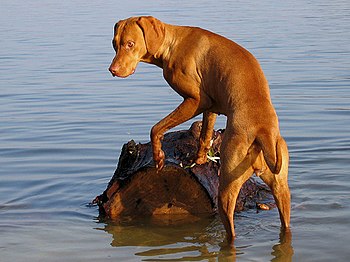 |
| A picture of a Vizsla (Photo credit: Wikipedia) |
Vizsla Problems
Every dog owner has their share of problems. Their dogs will dig, chew, jump, whine, or bark away whenever it is least convenient. So, if you own a Vizsla, problems are a very real possibility, especially if the dog is not properly trained from a young age. To help with each of these problems, here are some common issues and Vizsla training tips:
Vizsla Separation Anxiety
The Hungarian Vizsla can easily grow agitated and start showing signs of extensive anxiety - especially if you give them too much attention when leaving or coming home. Not only will the dog bark when you're away, but they may also begin to hurt themselves, pulling hair, scratching their paws, breaking teeth, or making messes in the house. This is a major issue for many reasons, not the least of which is the sanctity of your home. To help the Hungarian Vizsla with anxiety, teach the dog from a young age not to seek attention before or after you leave or return home. Furthermore, this behaviour needs to be taught by the whole family. Even one person "saying goodbye" to your Vizsla can create anxious feelings.
can easily grow agitated and start showing signs of extensive anxiety - especially if you give them too much attention when leaving or coming home. Not only will the dog bark when you're away, but they may also begin to hurt themselves, pulling hair, scratching their paws, breaking teeth, or making messes in the house. This is a major issue for many reasons, not the least of which is the sanctity of your home. To help the Hungarian Vizsla with anxiety, teach the dog from a young age not to seek attention before or after you leave or return home. Furthermore, this behaviour needs to be taught by the whole family. Even one person "saying goodbye" to your Vizsla can create anxious feelings.
Vizsla Neuroses
Beyond separation anxiety, Vizslas can grow neurotic over a number of issues - sounds, digging, scratching, eating, or other common behaviours. It is usually easy to avoid many of these issues by keeping the dog busy and giving them lots of exercises. The Hungarian Vizsla needs at least 1-2 hours of exercise a day in some form or another. If you cannot spend time at home with your Vizsla in the first 1-2 years of ownership, you should definitely consider a breed that does better spending time alone. The Hungarian Vizsla is in general quite needy - they crave interaction with both humans and other dogs. Additionally, consider getting a second dog for company or try to spend at least 2-3 hours of every day in the company of your Vizsla, no matter how busy you get.
needs at least 1-2 hours of exercise a day in some form or another. If you cannot spend time at home with your Vizsla in the first 1-2 years of ownership, you should definitely consider a breed that does better spending time alone. The Hungarian Vizsla is in general quite needy - they crave interaction with both humans and other dogs. Additionally, consider getting a second dog for company or try to spend at least 2-3 hours of every day in the company of your Vizsla, no matter how busy you get.
Vizsla Hunting Drive
Another potential problem which relates to their hunting heritage is the drive to chase (and kill) small animals such as mice and birds. It's a good idea to keep your Vizsla locked up when outside, and to make sure they meet any other family pets at a young age. The Hungarian Vizsla's problems are similar to most dog problems but can grow exponentially if you are not careful to nip them in the bud early. Spend time with your Vizsla, address common tendencies and build a relationship early so that your dog remains healthy and happy for the duration of their life.
The question is, can you alter your Vizsla's bad behaviours for good? Yes, you can!
|

No comments:
Post a Comment